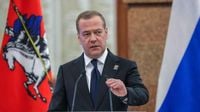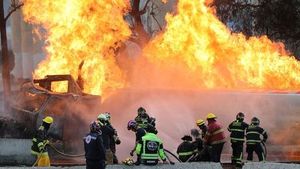As the conflict in Ukraine continues to escalate, recent developments indicate a shift in negotiations between the United States and Russia. Dmitri Medwedew, former president of Russia, has threatened Kyiv with a swift conclusion to the war, suggesting that the U.S. may be preparing to make concessions to Moscow. Amidst increasing frustration over the lack of progress in talks, U.S. President Donald Trump has indicated that he may abandon negotiations with Russian President Vladimir Putin if significant advancements are not made.
On Good Friday, April 18, 2025, Russian forces launched air raids on the eastern Ukrainian cities of Charkiw and Sumy, resulting in at least 50 injuries from a prior rocket attack. The continued aggression has heightened tensions as the U.S. contemplates recognizing Russian control over Crimea, a move that could significantly alter the dynamics of the ongoing conflict.
Medwedew's comments reflect a broader strategy from Russia, which views the potential withdrawal of the U.S. from negotiations as an opportunity for a quick victory. He stated, "It is wise that U.S. representatives want to wash their hands of the issue when progress is lacking. The EU should do the same. Then Russia will resolve it faster." This perspective underscores Russia's belief that time is on their side, as they continue to make gradual gains on the battlefield despite suffering heavy losses.
Ukrainian President Volodymyr Selenskyj has accused U.S. Special Envoy Steve Witkoff of echoing Kremlin narratives, particularly after Witkoff's recent meeting with Putin in St. Petersburg. Selenskyj expressed concern, stating, "I believe that Mr. Witkoff has adopted the Russian strategy," highlighting the delicate balance the U.S. must maintain in its diplomatic efforts.
During a press conference on April 18, Trump emphasized the urgency of reaching an agreement in negotiations with Russia. He remarked, "If one side makes it very difficult for any reason, we will simply say: 'You are foolish, you are foolish. You are terrible people,' and we will simply leave it – but hopefully, we won't have to do that." This statement reflects the administration's growing impatience with the stalled talks.
Meanwhile, U.S. Secretary of State Marco Rubio has stated that the U.S. has "other priorities" beyond the Ukraine conflict. He warned that if an agreement is not reached soon, the U.S. will need to shift its focus elsewhere. This sentiment echoes a broader concern within the Trump administration regarding the effectiveness of ongoing negotiations.
In a significant military development, Ukrainian forces successfully targeted a Russian missile base in the city of Schuja, located approximately 700 kilometers from the Ukrainian border. This base was previously responsible for attacks on Sumy, where 36 Ukrainians lost their lives. The Ukrainian military utilized long-range drones to carry out the strikes on April 16 and 17, marking a notable achievement amid ongoing hostilities.
As the conflict persists, the intensity of battles along the front lines remains high. Reports indicate that there were 65 confrontations on Good Friday alone, with the Ukrainian army successfully repelling numerous Russian assaults. The situation remains fluid, with both sides preparing for continued engagements.
In a recent meeting in Rome, U.S. Vice President JD Vance expressed optimism about finding a peaceful resolution to the conflict. He stated, "We are optimistic that we can bring this war, this very brutal war, to an end." However, specifics regarding the peace process remain scarce, and the Trump administration's willingness to make concessions is under scrutiny.
Additionally, reports suggest that the Trump administration is considering easing some sanctions against Russia as part of a broader strategy to facilitate negotiations. This proposal includes potential territorial concessions to Putin, such as freezing the front lines and preventing Ukraine from joining NATO. Such moves have sparked concern among Ukrainian officials, who fear the implications of conceding territory to Russia.
As negotiations evolve, the U.S. and Ukraine signed a letter of intent on April 17, 2025, which aims to provide the U.S. access to raw materials in exchange for military support. This agreement is seen as a crucial step in strengthening Ukraine's defense capabilities while securing economic partnerships.
Despite ongoing military support from the U.S. and other allies, the prospect of a swift resolution to the conflict appears increasingly uncertain. Trump's administration has faced criticism for its handling of the situation, particularly regarding its commitment to military assistance for Ukraine. In March, Trump temporarily halted all deliveries, raising concerns about the future of U.S. support.
As the situation unfolds, both the Ukrainian government and its allies are closely monitoring developments. The potential for territorial concessions and the evolving dynamics of U.S.-Russia relations will play a critical role in shaping the future of the conflict. Selenskyj's administration remains committed to resisting Russian aggression, but the pressure to negotiate a viable peace agreement is mounting.
In conclusion, the ongoing conflict in Ukraine is at a critical juncture, with diplomatic negotiations teetering on the brink of collapse. As both sides grapple with the complexities of the situation, the international community watches closely, hoping for a resolution that brings lasting peace to the region.







